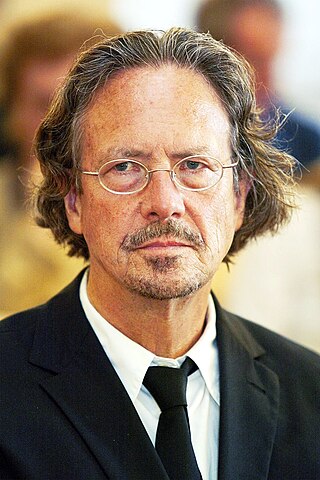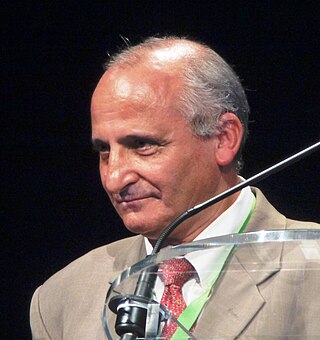
The Nobel Prizes are five separate prizes awarded to those who, during the preceding year, have conferred the greatest benefit to humankind, as established by the 1895 will of Swedish chemist, engineer, and industrialist Alfred Nobel, in the year before he died. Prizes were first awarded in 1901 by the Nobel Foundation. Nobel's will indicated that the awards should be granted in the fields of Physics, Chemistry, Physiology or Medicine, Literature, and Peace. A sixth prize for Economic Sciences, endowed by Sweden's central bank, Sveriges Riksbank, and first presented in 1969, is also frequently included, as it is also administered by the Nobel Foundation. The Nobel Prizes are widely regarded as the most prestigious awards available in their respective fields.

Peter Handke is an Austrian novelist, playwright, translator, poet, film director, and screenwriter. He was awarded the 2019 Nobel Prize in Literature "for an influential work that with linguistic ingenuity has explored the periphery and the specificity of human experience." Handke is considered to be one of the most influential and original German-language writers in the second half of the 20th century.
Since the first award in 1901, conferment of the Nobel Prize has engendered criticism and controversy. After his death in 1896, the will of Swedish industrialist Alfred Nobel established that an annual prize be awarded for service to humanity in the fields of physics, chemistry, physiology or medicine, literature, and peace. Similarly, the Sveriges Riksbank Prize in Economic Sciences in Memory of Alfred Nobel is awarded along with the Nobel Prizes.

John Bannister Goodenough was an American materials scientist, a solid-state physicist, and a Nobel laureate in chemistry. From 1986 he was a professor of Materials Science, Electrical Engineering and Mechanical Engineering, at the University of Texas at Austin. He is credited with identifying the Goodenough–Kanamori rules of the sign of the magnetic superexchange in materials, with developing materials for computer random-access memory and with inventing cathode materials for lithium-ion batteries.

Sir Michael Stanley Whittingham is a British-American chemist. He is a professor of chemistry and director of both the Institute for Materials Research and the Materials Science and Engineering program at Binghamton University, State University of New York. He also serves as director of the Northeastern Center for Chemical Energy Storage (NECCES) of the U.S. Department of Energy at Binghamton. He was awarded the Nobel Prize in Chemistry in 2019 alongside Akira Yoshino and John B. Goodenough.

Rachid Yazami is a Moroccan scientist, engineer, and inventor. He is best known for his critical role in the development of the graphite anode for lithium-ion batteries and his research on fluoride ion batteries.

The Nobel Prize in Chemistry is awarded annually by the Royal Swedish Academy of Sciences to scientists in the various fields of chemistry. It is one of the five Nobel Prizes established by the will of Alfred Nobel in 1895, awarded for outstanding contributions in chemistry, physics, literature, peace, and physiology or medicine. This award is administered by the Nobel Foundation, and awarded by the Royal Swedish Academy of Sciences on proposal of the Nobel Committee for Chemistry which consists of five members elected by the Academy. The award is presented in Stockholm at an annual ceremony on 10 December, the anniversary of Nobel's death.

The Nobel Peace Prize is one of the five Nobel Prizes established by the will of Swedish industrialist, inventor, and armaments manufacturer Alfred Nobel, along with the prizes in Chemistry, Physics, Physiology or Medicine, and Literature. Since March 1901, it has been awarded annually to people who have "done the most or the best work for fraternity between nations, for the abolition or reduction of standing armies and for the holding and promotion of peace congresses." The Oxford Dictionary of Contemporary History describes it as "the most prestigious prize in the world."

Akira Yoshino is a Japanese chemist. He is a fellow of Asahi Kasei Corporation and a professor at Meijo University in Nagoya. He created the first safe, production-viable lithium-ion battery, which became used widely in cellular phones and notebook computers. Yoshino was awarded the Nobel Prize in Chemistry in 2019 alongside M. Stanley Whittingham and John B. Goodenough.

The 2019 Nobel Prize in Literature was awarded to the Austrian writer Peter Handke "for an influential work that with linguistic ingenuity has explored the periphery and the specificity of human experience." The prize was announced by the Swedish Academy on 10 October 2019. Handke is the second Austrian Nobel laureate in Literature after Elfriede Jelinek, who won the prize in 2004.
The 2022 Nobel Prizes were awarded by the Nobel Foundation, based in Sweden. Six categories were awarded: Physics, Chemistry, Physiology or Medicine, Literature, Peace, and Economic Sciences. The winners in each category were announced from October 3 to October 10.
The 2021 Nobel Prizes were awarded by the Nobel Foundation, based in Sweden. Six categories were awarded: Physics, Chemistry, Physiology or Medicine, Literature, Peace, and Economic Sciences.
The 2018 Nobel Prizes were awarded by the Nobel Foundation, based in Sweden. Six categories were awarded: Physics, Chemistry, Physiology or Medicine, Literature, Peace, and Economic Sciences.
The 2015 Nobel Prizes were awarded by the Nobel Foundation, based in Sweden. Six categories were awarded: Physics, Chemistry, Physiology or Medicine, Literature, Peace, and Economic Sciences.
The 2013 Nobel Prizes were awarded by the Nobel Foundation, based in Sweden. Six categories were awarded: Physics, Chemistry, Physiology or Medicine, Literature, Peace, and Economic Sciences.




















